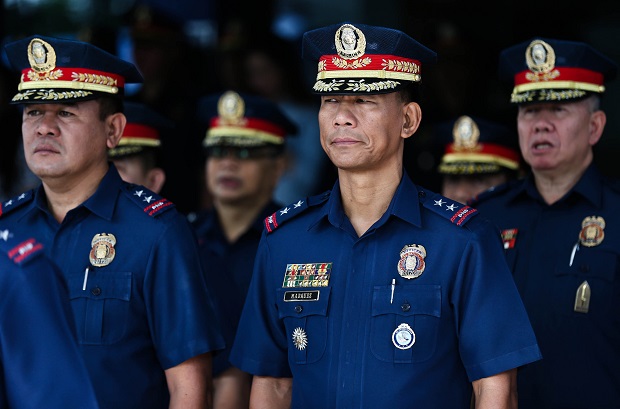Philippine National Police chief Director General Ricardo Marquez wants to welcome noncollege graduates and K to 12 graduates into the uniformed service, saying these undergraduates could beef up the street patrolling team of the force.
But the Civil Service Commission (CSC) warned that accepting nonbaccalaureate degree holders would run counter to the government’s goal to professionalize the PNP.
At present, only college graduates could become uniformed PNP personnel.
Speaking at the Senate hearing on the modernization of the PNP, Marquez said those who do not have access to higher education could still serve the police force.
“Lowering the educational requirement would probably allow the PNP to take in those bright students who are financially challenged to pursue higher education,” Marquez said.
“I agree that we should professionalize this organization, but 72 units are not the only step to professionalize. In the end, what we will talk about is, ‘Are they competent?,’” he said.
These noncollege graduates could be made competent, Marquez said.
He noted that the dynamics on the ground was that PNP officers, even those in the entry level rank of Police Officer 1, were at times reluctant to patrol the streets, being college degree holders.
But he said nondegree holders could enter the PNP as uniformed personnel with the rank of patrolman. They could serve as responders, street patrollers or PNP vehicle drivers.
They would not be promoted unless they finish their college education, but the PNP could coordinate with higher learning institutions to provide them with distance education to give them the chance to be promoted.
He noted that in other parts of the world, a college education is not a minimum requirement for entry into the police force.
Sen. Grace Poe, who chaired the hearing on the PNP modernization, agreed with the points Marquez raised, saying she would prioritize the bill to allow noncollege graduates to serve the PNP as uniformed personnel.
Poe’s bill seeks to allow graduates of the K to 12 program entry to the PNP as long as they pass all necessary examinations.
Big flaw
She said the requirement of a college degree for entry into the PNP, even for personnel who would be doing jobs that would not require this level of education, was a big flaw in the PNP requirements.
During Thursday’s hearing, CSC lawyer Krunimar Escudero noted that in the previous law, nondegree holders were allowed to be appointed to uniformed positions in the PNP. But this was removed in the present law, which requires a college degree for uniformed officers.
“If we want to maintain merit and fitness and professionalization in the PNP, we should maintain [what is in the law],” Escudero said.
Poe also said there is a need for better exams—with more relevant and practical questions—in the PNP.
She said in one of the officers’ exams, there was apparently a question related to the venue of the summer Olympics in a particular year, which she said was not relevant to police officers’ job.
Poe said the questions should be both practical and academic. She also asked for a copy of the last exam administered to the PNP.
